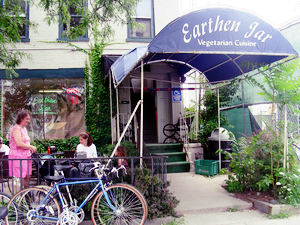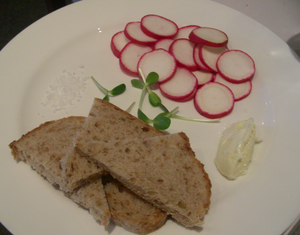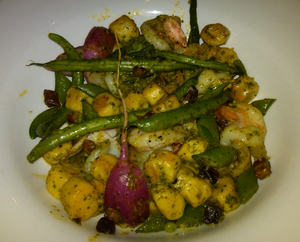Progressive Town, Progressive Food
 For as long a I can remember the food scene in Ann Arbor, Michigan has been grounded in hippy health-food culture. Vegetarian, vegan, health-conscious, and organic foods abound in co-ops and eateries all over town. One well-established restaurant that exemplifies conscientious consumption of food is The Earthen Jar–a vegetarian Indian buffet.
For as long a I can remember the food scene in Ann Arbor, Michigan has been grounded in hippy health-food culture. Vegetarian, vegan, health-conscious, and organic foods abound in co-ops and eateries all over town. One well-established restaurant that exemplifies conscientious consumption of food is The Earthen Jar–a vegetarian Indian buffet.
More recently, Ann Arbor’s affinity for fresh and local food has flowered from its health-food roots into a socially aware upscale restaurant called Grange. Our Aunt Lynn and Uncle Lawry took us to eat at both restaurants during our stay with them in Ann Arbor.
 The Earthen Jar has always been one of our healthy-food favorites in Ann Arbor. At this ethnic eatery, they price the all-vegetarian Indian food by weight, serve refrigerator-cold water in metal cups, and jam Bob Marley over the speakers nonstop!
The Earthen Jar has always been one of our healthy-food favorites in Ann Arbor. At this ethnic eatery, they price the all-vegetarian Indian food by weight, serve refrigerator-cold water in metal cups, and jam Bob Marley over the speakers nonstop!
We ate lunch at the Earthen Jar and enjoyed the casual atmosphere, spicy lentils,  crisp potato samosas, and a spicy chickpea salad. Unfortunately though, we were unimpressed by their naan– it was dry and not homemade–and the sag paneer dish of spinach and fresh cheese which was quite bland. Shortcomings aside, the Earthen Jar has long been a veritable Shangri-La for vegetarians and consistently satisfies the appetites of University of Michigan’s savvy undergrads and worldly professors!
crisp potato samosas, and a spicy chickpea salad. Unfortunately though, we were unimpressed by their naan– it was dry and not homemade–and the sag paneer dish of spinach and fresh cheese which was quite bland. Shortcomings aside, the Earthen Jar has long been a veritable Shangri-La for vegetarians and consistently satisfies the appetites of University of Michigan’s savvy undergrads and worldly professors!
If hippy culture defines the restaurant scene in Ann Arbor, then restaurant Grange is a hippy who grew up and put on a collared shirt and slacks! Grange is an upscale incarnation of the idea that eating fresh food, prepared well, is the pinnacle of healthy and delicious dining.
 Grange’s dedication to the contemporary ideal of using only fresh, local ingredients and maintaining personal relationships with farmers is a natural evolution of Ann Arbor’s progressive co-op movement of the 1970’s. This puts the Grange, a restaurant of refinement and locality, in perfect harmony with Ann Arbor’s food culture. The city’s close proximity to many organic and many natural farms creates the necessary infrastructure to support a restaurant like Grange.
Grange’s dedication to the contemporary ideal of using only fresh, local ingredients and maintaining personal relationships with farmers is a natural evolution of Ann Arbor’s progressive co-op movement of the 1970’s. This puts the Grange, a restaurant of refinement and locality, in perfect harmony with Ann Arbor’s food culture. The city’s close proximity to many organic and many natural farms creates the necessary infrastructure to support a restaurant like Grange.
The dining room of Grange has an easy sense of refinement without feeling stuffy. The décor is clean and unpretentious and  the service is professional and friendly. To begin the meal, I ordered a French wine called “entre deux-mers,” a crisp, summer-white Bordeaux that was an excellent value and tasted great with an appetizer of ripe summer tomato salad with green leaf lettuce and fresh mozzarella cheese.
the service is professional and friendly. To begin the meal, I ordered a French wine called “entre deux-mers,” a crisp, summer-white Bordeaux that was an excellent value and tasted great with an appetizer of ripe summer tomato salad with green leaf lettuce and fresh mozzarella cheese.
 For a second appetizer, we shared a plate of thickly sliced radishes served with soft, whipped butter, crunchy sea salt, and crusty bread. This classic combination showcased the freshness of the radishes–sweet and juicy with a spicy kick–that was tempered by the rich bread and butter.
For a second appetizer, we shared a plate of thickly sliced radishes served with soft, whipped butter, crunchy sea salt, and crusty bread. This classic combination showcased the freshness of the radishes–sweet and juicy with a spicy kick–that was tempered by the rich bread and butter.
 For her entrée, Amanda ate gnocchi with Michigan shrimp, green beans, snow peas, onion, radish, bacon, and pesto. The gnocchi was rich with an earthy potato flavor and the vegetables were juicy, refreshing, and crisp. The vegetables providing an uplifting sweetness and texture to the dish. The shrimps were gently cooked until perfectly tender and had a subtle mineral flavor and sweetness.
For her entrée, Amanda ate gnocchi with Michigan shrimp, green beans, snow peas, onion, radish, bacon, and pesto. The gnocchi was rich with an earthy potato flavor and the vegetables were juicy, refreshing, and crisp. The vegetables providing an uplifting sweetness and texture to the dish. The shrimps were gently cooked until perfectly tender and had a subtle mineral flavor and sweetness.
 I am often unable to resist the appeal of a great, naturally raised chicken breast; at our dinner at Grange, I was not disappointed. The chicken tasted fresh and delicate. It was served with a sweet and tart tomato jam of fresh-popped cherry tomatoes, hearty young kale, and an indulgent block of creamy corn encased in a crisp, deep-fried crust.
I am often unable to resist the appeal of a great, naturally raised chicken breast; at our dinner at Grange, I was not disappointed. The chicken tasted fresh and delicate. It was served with a sweet and tart tomato jam of fresh-popped cherry tomatoes, hearty young kale, and an indulgent block of creamy corn encased in a crisp, deep-fried crust.
 Ann Arbor’s long history of health-food culture is fertile ground for the current fresh and local food movement that is being nurtured here by responsible farmers, food connoisseurs, and community advocates. It was great to enjoy fresh food, raised and prepared well by caring farmers, at a responsible restaurant such as Grange. The management, staff, and chefs create a great dining experience that achieves a symbiotic relationship between restaurant and farmer!
Ann Arbor’s long history of health-food culture is fertile ground for the current fresh and local food movement that is being nurtured here by responsible farmers, food connoisseurs, and community advocates. It was great to enjoy fresh food, raised and prepared well by caring farmers, at a responsible restaurant such as Grange. The management, staff, and chefs create a great dining experience that achieves a symbiotic relationship between restaurant and farmer!

